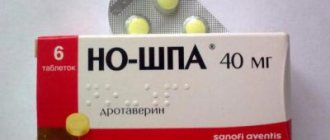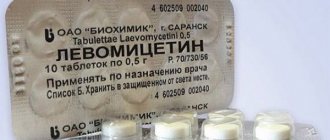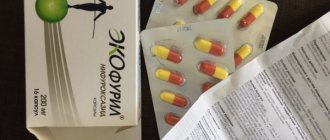How the drug works
Senade is a medicine for constipation, belonging to the group of laxatives, of herbal origin. The main components of the drug are calcium salts of sennosides A and B. They are extracted by squeezing the senna plant, which is known to irritate peristalsis, which causes defecation.
Once in the body, the drug activates the receptors in the colon mucosa, which leads to irritation of smooth muscles and increases the frequency of its contractions.
Constipation tablets Senade have a gentle laxative effect. The effect after taking the drug is achieved after 8–10 hours. At the same time, the product not only activates the intestines, but also guarantees easy movement of feces, as it helps soften them.
Drug review
For what pathologies is the drug used?
The main purpose of Senade tablets is to eliminate problems with bowel movements. The drug is prescribed for:
- constipation caused by atony of intestinal smooth muscles;
- functional constipation;
- painful bowel movements due to pathologies of the rectum (proctitis, hemorrhoids).
“Senade” is used for obesity to facilitate bowel movements, cleanse the intestines and normalize the digestion process.
The drug Senade belongs to the pharmacological laxatives
General characteristics
The basis of “Senade” is made up of herbal ingredients. The medicine is produced in tablets (round, with beveled edges, brown) of 40 or 60 pieces per package.
Senade packs of 500 tablets are available for sale.
The main component is senna extract (1 tablet - 93.3 mg). The extract contains derivatives of sennoside salts A and B (dosage - 13.5 mg).
The tablets contain magnesium stearate, starch, cellulose and other auxiliary components.
Pharmacological action of "Senade"
Senade works against constipation according to a fairly simple scheme:
- The active components (derivatives of sennoside salts) enter the intestine and have a targeted effect on nerve endings localized in the mucous membrane.
- When active substances enter the receptors, the smooth muscles of the large intestine are stimulated.
- As a result, peristalsis is activated - the strength, amplitude and frequency of smooth muscle contractions increases.
- The main action of "Senade" is aimed at the colon. It is she who is responsible for the formation of feces and the direct movement of feces to the rectum.
Senna herb is fast-acting in the absence of stool, stimulates intestinal motility.
Many people are interested in how often you can take Senade for constipation, and whether taking the drug will lead to diarrhea and other digestive disorders? Here's something to consider:
- “Senade” stimulates bowel movements mainly due to peristalsis, i.e. fecal masses are practically unchanged;
- the drug does not affect absorption processes, therefore the risk of diarrhea when taking it will be minimal;
- the action of the tablets does not affect the digestion process, therefore problems during administration (nausea, vomiting, dyspepsia) arise in exceptional cases.
How much Senade you need to drink for constipation depends on the doctor’s testimony and the severity of the condition. If the bowel movement has returned to normal, you can stop taking the drug. Cancellation does not cause fecal stagnation.
Contraindications for taking Senade
The way Senade works for constipation (stimulating peristalsis without affecting the digestion process itself) determines the main contraindications to taking this drug:
- intestinal obstruction;
- spastic constipation (after taking the pills the situation may worsen);
- inflammatory processes in the abdominal cavity;
- bleeding in the gastrointestinal tract or in the uterus;
- cystitis;
- violation of water-salt balance;
- strangulated hernia.
Thanks to getting rid of stagnation in the large intestine, the feeling of heaviness, bloating and discomfort goes away.
Senade tablets should not be taken for constipation and for those patients who have allergic reactions to senna or other components of the drug.
It is not advisable to give Senade to children under 6 years of age. To combat constipation at an early age, you need to use alternative medications.
In what cases of constipation is Senade prescribed?
The drug gives positive results only in cases of problems with defecation of a functional origin. Senade is usually prescribed to patients with sluggish peristalsis caused by an inactive lifestyle. Therefore, among patients who are prescribed this drug, bedridden patients, people who have undergone surgery and pregnant women are most often found.
Recipes, menus and diet products
We also recommend a drug that will help normalize intestinal function, read - Acipol reviews for infants, what dosage and at what age can it be given to children.
Also, indications for taking Senade are:
- haemorrhoids;
- proctitis and paraproctitis;
- intestinal atony;
- acute constipation;
- presence of anal fissures.
In addition, the drug is often prescribed several days before diagnostic studies of the abdominal and intestinal organs. In some cases, Senade is recommended for patients to take before surgery.
For chronic problems with bowel movements, Senade is used to regulate bowel movements. The drug is no less effective for constipation that occurs due to long-term use of certain medications. This especially applies to medications that suppress the activity of peristalsis and intestinal muscles.
"Senade" when carrying a child
Use of "Senade" for pregnant women:
- during normal pregnancy, the use of the drug to solve problems with bowel movements is allowed;
- if any of the side effects occur, the expectant mother should stop taking Senade and switch to an alternative drug;
- the drug is not prescribed to women who are at risk of miscarriage (the effect on intestinal receptors can provoke uncontrolled contractions of the uterus, causing miscarriage);
- It is not advisable to use Senade to relieve constipation that lasts more than two days (the reasons are the same as in the previous paragraph).
Rules for receiving Senade
To achieve the desired effect in case of stool retention, you need to know how to take Senade for constipation correctly. According to the instructions, it is recommended to drink this drug once a day. Since senna extract has a mild effect, which is achieved after 8–10 hours, Senade is best consumed in the evening, shortly before bedtime. This ensures morning bowel movements and helps regularize your natural bowel movement schedule.
The dosage is as follows:
- children under 12 years old - half a tablet once a day;
- teenagers over 12 years old - 1 tablet. per day;
- adults - 1 tablet. once a day.
For severe forms of constipation, the dosage can be increased by exactly half: children 12 years old up to 1 tablet, adults up to two tablets. But the drug should be taken again no earlier than 8 hours later, when the effect of the first dose did not bring results.
The tablets should be taken with plenty of water, preferably warm, but not hot. To speed up the action, you can drink a glass of salt water. After which defecation will occur in 6–7 hours.
If Senade does not cause bowel movements after three days, even with maximum dosages, then you should consult a doctor.
It is not recommended to give Senade to children under 6 years of age. The drug should also be taken with caution during pregnancy, especially if there is a threat of miscarriage or problems with uterine tone.
Application and dosage
It is important to know how to take the product correctly in order to achieve the desired result. Senade – brown tablets for oral administration. The medication is taken orally and washed down with water.
The dosage of the drug depends on the age of the patient; usually the tablets are taken once a day, shortly before bedtime. If the decision to take the medication is made independently, the course of treatment lasts no more than five days. During this period, stool returns to normal if constipation is not caused by severe pathology of the digestive organs.
It is better if a doctor prescribes medication for constipation. The doctor will tell you how much to drink and determine the volume.
Senade for adults
An adult can start taking the medicine with one tablet a day. One tablet is the starting dosage for children over 12 years of age and adults. If after three days of treatment the stool has not returned to normal, the dose is increased by 1.5 times and therapy is continued for three more days. According to the specified algorithm, the dose increases to three tablets per day. A larger volume leads to an overdose.
For children
A child over 6 years old can take half a tablet at night and use the mentioned volume for two days. If the desired result is not achieved, you need to increase the volume to a tablet. Children aged 6 to 12 years are allowed to take a maximum of 2 tablets per day.
The course of taking Senade should not exceed 14 days. Long-term use of the medication may cause diarrhea and dehydration. If the medicine does not help, you need to consult a doctor so that the doctor can choose a more effective way to treat the disease.
During pregnancy
During pregnancy, a woman more than once encounters the phenomenon of delayed bowel movements. The symptom is dangerous for the mother and unborn child, but drug therapy is also fraught with unpleasant consequences.
Doctors do not recommend taking a senna-based drug during pregnancy. The medication does not affect the consistency of stool, but enhances intestinal motility. The process can provoke contractions of the uterus, which can lead to early miscarriage or premature birth!
For prolonged constipation, your doctor may recommend taking medication if the pregnancy is progressing normally and there are no other contraindications.
If symptoms that arise while taking the drug are detected, drug therapy should be stopped and consult a doctor for an alternative and safe treatment.
Senade for weight loss
Often, ladies who dream of losing excess weight, without hesitation, begin to use laxatives, mistakenly believing that in this way the kilograms will disappear faster. Senade, like most laxatives, does not affect weight loss. When taken along with the processed intestinal contents, liquid is released, and body weight is reduced due to water loss. But the pills do not burn fat and do not affect the metabolic process; there will be no weight loss.
It is acceptable to take the medicine as an adjunct to certain types of diets. The medication will help you remove extra pounds if you overeat or after a festive feast. But serious weight loss with a single drug is impossible.
Reception regimen for weight loss:
- With a protein diet - 2 tablets per day, twice a week.
- For rapid weight loss - 2 tablets for two days.
A two-day intake will help reduce weight by 2-3 kilograms by removing intestinal contents.
It must be borne in mind that the maximum effect in treating the disease is implied exclusively from complex therapy. The symptom will not return if you normalize your diet, organize a regime in which at least 8 hours are allocated for sleep, and meals are taken at the same time. It is important to include physical exercise in your schedule, which, if you have health problems, can be replaced with light walking.
Available contraindications and side effects
Despite the fact that Senade is a herbal preparation and has a gentle effect on peristalsis and intestinal muscles, the drug still has contraindications. The product should not be used for spastic constipation, as well as partial bowel movements accompanied by the release of bloody feces.
In addition, this laxative is prohibited for the following pathologies:
- constipation with abdominal pain;
- intestinal obstruction;
- peritonitis;
- acute or chronic cystitis;
- the presence of inflammation in the abdominal cavity;
- rectal and uterine bleeding.
Treatment with Senade should be stopped if an allergic reaction occurs, which may develop due to individual intolerance to some components of the drug. The drug is prescribed with extreme caution to pregnant women, as well as to people with kidney and liver dysfunction. You should not take this laxative if you have water and electrolyte imbalances.
The occurrence of side effects depends on how you drink Senade for constipation . If the drug is taken in excessive doses, it can provoke changes in the central nervous system and metabolism. Also, if taken incorrectly, the product will negatively affect the digestive system. Hematuria, discoloration of urine, or albuminuria are sometimes observed.
In addition, with long-term treatment with Senade in excessive doses, skin rashes may occur. The most dangerous side effect is vascular collapse associated with the negative effects of calcium salts of sennosides on the cardiovascular system.
Overdose
A single dose in excess of the norm does not pose a serious danger. A person may experience abdominal pain and flatulence.
The dose is systematically exceeded by people trying to lose weight using laxatives. Significantly exceeding the volume of medication leads to a serious consequence in the form of dehydration. Symptoms indicate a lack of fluid in the body:
- Weakness.
- Dry mucous membranes, thirst.
- Muscle spasms.
- Decreased urine volume.
When signs appear, it is necessary to replenish the water-salt balance using saline solutions.
Senade is an effective remedy for constipation. By following the doctor's recommendations on the use of the medication and the dosage of the drug, you can get rid of the symptom as soon as possible. But constipation is better prevented. To do this, it is enough to adjust your diet, perform simple physical exercises and undergo examinations of the gastrointestinal tract at least once a year.
Senade for constipation for the elderly
Intestinal dysfunction, manifested by constipation in older people, is quite common. Therefore, they always have laxatives in their medicine cabinet. But when treating bad stool in the elderly, you should be careful not to aggravate the disease or provoke side effects.
For such patients, it is recommended to take Senade if intestinal dysfunction occurs due to physical inactivity or lack of fiber in the diet. This drug is also often prescribed to bedridden patients and elderly people with problems with the digestive system.
The minimum dosage is 1 tablet per day, the maximum is 2 pieces, but no more. how to take Senade tablets for constipation in older people, so it is better not to self-medicate, but to immediately consult a specialist for advice.
"Senade" in veterinary medicine
Sometimes the described remedy is also used in veterinary medicine. So if you are wondering whether it is possible to give Senada to a cat for constipation, the answer will be positive.
But here's what you need to consider:
- It is advisable to give the drug as prescribed by a veterinarian;
- the product is used only to relieve severe constipation or to prepare for an x-ray examination;
- The dosage is determined based on the weight of the animal and the severity of the condition.
Precautionary measures
Patients often ask whether Senade is addictive. Doctors give a positive answer. Long-term use of the drug is addictive, causing “lazy bowel” syndrome. The effectiveness of the drug decreases sharply, which requires a constant increase in the dose. Therefore, the use of Senade tablets should be very careful. If after a course of treatment the stool has not returned, you should consult your doctor to determine the cause of chronic constipation.
If the doctor concludes that you need to continue taking laxatives, then in order to avoid side effects, you should take Senade tablets alternately with other drugs.
During the period of therapy, you should stop drinking alcoholic beverages. Senade and alcohol are absolutely incompatible.
A single overdose of Senade will not pose a risk to life, but will cause unpleasant symptoms: severe abdominal pain, diarrhea, nausea, flatulence.
Interaction with other drugs and alcohol
When taking Senade with antiarrhythmic drugs (Verapamil, Digoxin, Strophanthin, Egilok, Concor, Betaloc ZOK, Carvedilol, Anaprilin), monitoring of electrocardiographic parameters is necessary due to a possible decrease in the level of potassium in the blood and, as a result, an increase in the effect of antiarrhythmics.
People taking long-acting medications should be aware of a decrease in this property when taken together with Senade.
Senade prolongs the effect of thiazide diuretics and glucocorticosteroids, which requires monitoring blood potassium levels and electrocardiographic parameters.
During treatment with Senade, alcoholic beverages should be avoided due to increased dehydration in the case of long-term treatment of constipation.
The absorption of tetracyclines is slowed down when taken together with Senade.
Possible side effects when taking Senade
The most common side effect of the drug is diarrhea. To avoid it, you should start taking it with minimal dosages.
Mild nausea and stomach pain may also occur. Unlike Bisacodyl, for example, this pain is not acute and painful. More often it is aching in nature. In most patients, taking Senade does not provoke any discomfort in the epigastric region.
When taken regularly in large dosages, melanin may be deposited on the mucous membrane of the colon.
Contraindications
As a result of this feature, the indications for the use of the drug “Senade” include the following phenomena in their list:
- constipation of a systematic nature associated with the occurrence of hypotension or caused by insufficient and relatively sluggish activity of rectal peristalsis;
- functional constipation, which occurs as a result of prolonged ignoring of the body's urge to defecate, which results in the subsequent inability to go to the toilet without the use of auxiliary drugs;
- the need to regulate stool in the presence of proctitis, hemorrhoids or anal fissures;
- problems with excess weight, which led to the formation of obesity.
We suggest you read: Bisoprolol and alcohol compatibility - Pressure and everything about it
In most cases, the presence of sluggish intestinal motility is observed in people who lead a predominantly sedentary lifestyle. This feature is due to modern conditions of social development and the tendency to desire career growth.
As a result, obtaining visible results requires maintaining a sedentary lifestyle with often sedentary work with the possibility of moving by using public transport or a personal car.
As for the regulation of stool in the event of detection of diseases of the rectum, the main condition for eliminating pathogenic symptoms and resolving the uncomfortable situation is the systematic emptying of the intestinal contents.
In no case should you postpone or completely exclude the process of defecation from the life cycle of the body, because such an irresponsible decision can provoke a worsening of the existing condition and even cause more serious diseases.
As an adjuvant, it is acceptable to use enemas based on oils, which significantly facilitate the passage of feces through the sphincter while simultaneously eliminating the pain syndrome.
Absolute contraindications include:
- the presence of severe sensitivity, intolerance or an allergic reaction to the components of the drug;
- the occurrence of spastic constipation;
- presence of intestinal obstruction;
- identification of pain in the abdominal area, which is characterized by the impossibility of determining the nature of its occurrence;
- the presence of a strangulated hernia;
- the course of acute inflammatory diseases in the abdominal organs (in particular, ulcerative colitis, Crohn's disease, appendicitis, etc.);
- the presence of cystitis, peritonitis, gastritis;
- identification of water-electrolyte imbalances;
- presence of uterine bleeding.
In the category group of relative contraindications, it is customary to distinguish:
- the course of the period following the implementation of abdominal surgery;
- presence of liver and kidney diseases;
- the presence of a period of pregnancy, breastfeeding and childhood less than 6 years.
Patients with such a property of the body as lactose intolerance should avoid taking the drug "Senade". This fact is due to the presence of milk sugar in the medicine as one of the components.
- constipation associated with hypotension and weakening of intestinal smooth muscle tone;
- functional failure to pass feces, when the urge to defecate is ignored, which subsequently causes a stop in the movement of fecal products;
- excessively excess body weight.
- increased level of sensitivity to the components of the drug;
- presence of symptoms of ileus;
- established pain syndrome in the peritoneum of unknown etiology;
- strangulated hernia;
- inflammation of the peritoneum;
- uterine hemorrhages.
- intolerance to the components of the composition;
- spastic constipation;
- kidney disease, liver disease, heart failure;
- intestinal obstruction;
- lactation;
- internal bleeding;
- disturbances of water and electrolyte balance.
The need to regulate stool is caused by dilation of the veins and the formation of nodes in the lower part of the rectum, inflammation of the mucous surface of the tube. Insufficient contractility of the intestinal tract is often associated with a sedentary lifestyle and low physical activity of a person. Excessively high-calorie foods aggravate the negative impact, which, in general, leads to the development of constipation.
The same problems arise in modern children, who are overloaded with classes and practically do not have sufficient physical training. The problem category includes patients who have undergone surgery and the elderly. The use of Senada in these cases is considered the most effective way to eliminate non-chronic forms of intestinal dysfunction.
In case of disease of the direct intestinal canal, timely emptying is important. Any forced delays worsen the patient’s condition and increase painful symptoms. To facilitate the process of defecation, it is recommended to perform a counter oil enema, since it dulls the pain of the process.
For people diagnosed with lactose intolerance, the medication is not prescribed due to the presence of lactose glucose in its composition. In case of relative contraindications, the use of Senada is possible only under the supervision of a physician in compliance with increased safety measures. Temporary prohibitions apply to the postoperative period, functional disorders of the liver and kidneys, pregnancy and at the stage of lactoformation. The drug is not allowed to be prescribed to children under 6 years of age.
The chemical does not change the properties of feces, which, as a result of prolonged inhibition of defecation, can become excessively dry and hard due to the absorption of water. This undesirable phenomenon causes pain during bowel movements. This cannot be allowed during gestation in late pregnancy.
At the initial stage of gestation, the effect of the pharmaceutical drug can also be negative due to increased tone of the smooth muscles of the uterus. Instructions for use recommend using capsules if the obstruction lasts no more than 2 days. Along with taking the medication, you need to increase your fluid intake so that the stool becomes softer, which makes it easier to pass.
Senade is strictly prohibited during pregnancy. Contractions of the intestine can cause spastic pain, which is dangerous for a woman due to strong spasms of the abdominal wall muscles. They can end in premature birth or miscarriage. In the early stages, Senade is contraindicated because it increases the tone of the smooth muscles of the uterus. Other contraindications from the instructions:
It is recommended to use Senade tablets, which normalizes stool, for constipation, which is caused by weak peristalsis and hypotension of the large intestine. In addition, the drug is indicated if you have hemorrhoids, anal fissures, or require stool regulation due to proctitis.
Before taking Senade tablets, you should familiarize yourself with the contraindications for use. The drug should not be taken if:
- strangulated hernia;
- intestinal obstruction;
- spastic constipation;
- abdominal pain of unknown origin;
- peritonitis;
- acute inflammatory diseases of the abdominal cavity;
- cystitis;
- disturbances of water-electrolyte metabolism;
- for uterine and gastrointestinal bleeding;
- if you have hypersensitivity to the components present in the tablets.
It is also correct to take tablets with caution in case of kidney and/or liver disease, after abdominal surgery, as well as during pregnancy or the lactation period.
Many people wonder whether it is possible to take this drug during pregnancy? It is possible, but the tablets should be prescribed to pregnant women with caution, and also not to abuse this drug while breastfeeding.
Medicinal properties
The mechanism of action is to stimulate peristalsis of the digestive organ. Sennosides, once in the gastrointestinal tract, easily reach the large intestine. Its bacteria break down substances into biologically active components (antranols and anthrones). These elements have an irritating effect on the mucous membrane of the large intestine, as a result of which they stimulate its motility and accelerate the process of releasing the organ from feces.
In addition, anthranols and anthrones interfere with the absorption of water by the body. Free fluid is retained in the lumen of the colon, causing the density of feces to significantly decrease. This facilitates their rapid release. This is how intestinal cleansing occurs.
Subsequently, sennosides are metabolized by liver cells. Metabolites (metabolic products) practically do not enter the body, but are excreted by the organs of the excretory system. Therefore, Senade tablets for constipation do not have significant side effects.
After what time the remedy begins to act depends on individual characteristics (lifestyle, nutrition, physiology). The instructions indicate that the laxative effect of Senade appears 10-12 hours after administration. During this period, bowel movements occur in the majority of people suffering from constipation. Also, the duration of action is determined by the dosage taken. Its increase leads to a faster onset of bowel movements.
The average course of treatment lasts from 7 to 10 days, after which in most cases regular bowel movements are restored.
It is not recommended to exceed the course of administration on your own, as side effects may occur. After stopping the drug, no withdrawal syndrome is observed.
Compatibility with other drugs
Senade has good compatibility with most medications. But when used with some drugs, there is a possibility of unwanted effects. This is due to hypokalemia that developed as a result of exceeding the course of treatment.
Simultaneous use with cardiac glycosides against the background of a decrease in the amount of potassium in the body can cause an increase in their pharmacological action.
Use with diuretics will increase the risk of dehydration and the development of potassium deficiency.
Reviews
Reviews from those who have used the Senade laxative convince that the medicine effectively eliminates bowel problems, and side effects are quite rare. Here are some of them:
Ruslan:
I have been using Senade tablets for constipation for a long time and am very pleased. Constantly forced to resort to laxatives. These tablets are cheap, which does not affect their effect. Among the disadvantages, I can note the following: the drug can be taken for constipation for no more than two weeks, because it causes dehydration of the body.
Hope:
Laxative Senade is an inexpensive remedy that gets the job done. After eating, I felt heaviness in my stomach. The doctor advised to cleanse the intestines more often and prescribed Senade. One tablet was not enough for me, I added one more. I recommend Senade tablets for constipation to everyone: they act quickly and gently, and do not cause pain in the abdominal area.
List of analogues of the drug "Senade"
The pharmacological market offers the following substitutes and analogues of Senade:
- "Antrasennin" - tablets.
- "Sennalax" - chewable tablets.
- "Regulax" - cubes for chewing.
- "Bekunis" - dragee.
- "Senalex" - tablets.
- "Gerbion Laxana" - tablets.
- "Senadexin" - tablets.
- Glaxenna tablets.
- "X-Prep" is a solution for oral administration.
- "Pursennid" - tablets.
- “Senna extract” – tablets.
- "Senadex" - tablets.
- "Tissasen" - tablets.
- "Ex-Lax" - chewable lozenges.
Contraindications for use
Contraindications to taking Senade occur in situations in which it is impossible to stimulate intestinal motility:
- Acute abdominal pain of unknown etiology is a contraindication to the use of Senade
Absolute: - History of adverse reactions to Senade components (to lactose).
Constipation due to high bowel tone (spastic).
- Inflammation of the peritoneum (peritonitis).
- in the period after operations on the abdominal organs and retroperitoneal space;
In what form is the medicine available?
The drug Senade comes in tablet form. The tablets have a classic cylindrical shape with slightly beveled edges. Thanks to the plant pigment, the medicine has a brown color with dark inclusions. A fault line is marked on one of the surfaces. To make drinking the tablets more pleasant, the drug is flavored with vanilla.
At the manufacturing plant, the tablets are placed in blisters of 20 pieces, which, in turn, are packaged in thick cardboard boxes of 2, 3 or 25 pieces. Each box with the drug contains an annotation, which should be read carefully before taking it.
Harm from Senade
Harm from taking Senade can only be expected as a result of taking it for more than two weeks or when self-prescribed without examining the digestive tract and finding out the cause of difficulty in bowel movements:
- loss of beneficial electrolytes: calcium, chlorine, potassium, magnesium and sodium.
- loss of water reserves;
- with long-term use, addiction may develop;
- abdominal pain, increased gas formation, vomiting, nausea, albuminuria, hematuria, drop in blood pressure, various types of impaired consciousness, skin rashes, seizures, muscle weakness.
Benefits and possible harm
For constipation, the doctor selects laxatives that are safe for the body, one of which is Senade. The drug does not have a negative effect on the mucous membranes of the gastrointestinal tract, and therefore rarely causes adverse reactions.
Senade laxative has a plant base and is intended to provide immediate assistance to the patient without harm to the body.
The action of tablets with a laxative effect is aimed at stimulating peristalsis, which irritates the receptors of the large intestine, restores the functioning of the organ, and eliminates constipation.
How to take Senade tablets?
04/22/2020 · : 1 · Reading time: 8 min · Views:
Situational constipation is a common problem. The most common causes are poor diet, lack of water intake and physical inactivity.
In cases where stool retention is not a habitual or chronic condition, responsible self-medication without consulting a doctor is acceptable. You can resort to using a short course of fast-acting stimulant laxatives.
The herbal remedy “Senade” in tablet form is a simple and affordable option.
"Senade" - instructions for use
The drug is based on dry extract of senna leaves. The product contains lactose and sodium lauryl sulfate - a controversial preservative that adherents of eco-products will not like.
The effect of the drug is achieved through the action of senna anthraglycosides on sensitive receptors of the colon mucosa. There is stimulation of contractile movements of the intestinal muscles - peristalsis. This speeds up the process of evacuation of intestinal contents.
Such intense stimulation can often be accompanied by spasms, soreness and excessive gas formation. To neutralize these unpleasant side effects, you can add the combined drug Meteospasmil to therapy. The components of this product have an antispasmodic and carminative effect.
What are Senade tablets used for?
The drug is taken for stool retention caused by a decrease in the tone of the intestinal muscles, with sluggish peristalsis.
Occasionally, Senade is still used to regulate stool in inflammatory diseases of the rectum and perianal area (hemorrhoids, anal fissures).
Now there are many products with a milder effect that are better suited for this purpose, for example, based on lactitol. Since hemorrhoids already cause enough discomfort, there is no need for additional cramps and flatulence.
The medicine for constipation "Senade" is not used to cleanse the intestines before diagnostic and instrumental studies - its effectiveness will not be enough. For this purpose, osmotic laxatives are prescribed according to appropriate regimens (Fortrans, Moviprep, Lavacol).
The scheme is as follows:
1. From 12 years of age and adults, 1 tablet is prescribed per dose, the frequency is 1 time per day at night. In case of ineffectiveness, the dose is increased to 2 - 3 tablets.
2. Children from 6 to 12 years old are prescribed 0.5 tablets per dose - also once a day at night. If there is no effect - up to 1 - 2 tablets.
For children under 6 years of age, Senade is rarely used, since due to the need for individual selection of the dose, the drug in this case must be used with great caution. Fortunately, there is a wide selection of more suitable products, where the instructions specifically describe the dosage for the little ones.
You should not increase the dose of Senade the next day if there is no effect after the first dose. The onset of effect from taking Senade ranges from 10 hours to 2 - 3 days. In the process of selecting an adequate dosage, the same dose must be taken for several days and only after that, if the effect does not occur, the amount is increased by 0.5 tablets at a time.
If, when taking Senade for 3 days of the maximum permissible daily dose, the result does not occur, you should consult a doctor.
To prevent the development of dehydration and electrolyte imbalance, it is very important to accompany therapy with any laxatives by increasing the volume of fluid consumed. It is advisable to drink at least 1.5 - 2 liters of drinking water per day. It is preferable to drink the bulk of this volume during the first half of the day, since metabolism is more intense at this time.
Important! Tea, coffee, kefir, yogurt, milk, sweet drinks, soups are food products, not water. They should not be taken into account in the amount of daily water consumption.
"Senade" for weight loss
Taking fast-acting stimulant laxatives for weight loss is not advisable.
Indeed, with an incorrect diet and a lack of drinking water in the diet, up to 10 - 12 kg of contents can accumulate throughout the intestines.
The intestines become sluggish, the digestive process is delayed, fermentation processes begin, excess mucus formation occurs, and the percentage of absorption of nutrients decreases. In this case, bowel movements can be irregular - both frequent and rare.
A short course of Senade and similar drugs will only help get rid of the contents of the lower parts of the colon and rectum. Perhaps this will give an immediate result - minus 0.5 - 2 kilos (depending on your luck), but without normalizing the regime and diet, increasing the consumption of drinking water and exercising, such a measure is only temporary self-deception.
For harmonious but effective gradual weight loss, you need to radically reconsider your diet and attitude towards physical activity.
Additional assistance in normalizing digestion and modeling the figure can be provided by specialized dietary supplements - “Fitomucil Slim Smart”, “Lactoflorin Flat Belly”, etc. It will be useful to include dietary supplements based on pre- and probiotics in the complex of measures.
Normalizing the balance of microflora will help the body get rid of toxins, better absorb nutrients, and the condition of the skin will improve.
Only in the case of clinical obesity, when the diagnosis and treatment has been determined by a specialist, can more serious prescription drugs be used.
"Senade" - side effects with long-term use
You should not start therapy with maximum doses and exceed the recommended course duration of 14 days.
Long-term use of Senade in high doses can lead to addiction of receptors and a decrease in effectiveness or, conversely, to the development of diarrhea.
Against the background of diarrhea, dehydration and electrolyte imbalance may occur with corresponding symptoms: fatigue, lethargy, muscle cramps, dizziness.
Most often, to normalize the condition, it is enough to discontinue the drug and increase water consumption. You can further improve the effectiveness of measures to combat dehydration with the help of electrolyte solutions - “Regidron”, “Biogaia ORS”. In case of overdose, however, it can even go as far as intravenous infusions of plasma substitutes.
A number of studies prove that in the long term, long-term use of senna or buckthorn preparations in high doses can lead to the development of intestinal cancer, since the anthraglycosides contained in these plants can have a genotoxic effect.
Long-term use of Senade in high doses can also cause a decrease in potassium levels in the blood (with the development of dehydration and electrolyte imbalance). This effect can enhance the effect of cardiac glycosides on the body and affect the effectiveness of antiarrhythmic drugs (when used together with Senade).
The risk of hypokalemia increases when taking Senade simultaneously with thiazide diuretics, licorice root-based drugs and glucocorticosteroids.
It would seem that these are very terrible side effects, however, we should not forget that their development occurs only in case of violation of the recommended dosages and duration of the course (and even then not always). If you follow the instructions, the risk of developing side effects tends to zero.
Is it possible to drink Senade during pregnancy and breastfeeding?
During post-marketing studies, there were no reports of any adverse effects of Senade on the fetus or the pregnant woman. However, the available experimental data on the likelihood of genotoxic effects of plant anthranols cannot be denied.
For this reason, Senade is contraindicated in the first trimester of pregnancy, and in the second and third trimesters it can only be prescribed by a doctor after weighing the risks. Considering that there are many modern laxatives that are approved for pregnant women “on-label” (according to the instructions), “Senade” will not be the drug of choice for the treatment of stool retention in pregnant women.
When breastfeeding, “Senade” is also not allowed, since a small amount of components passes into breast milk. This may cause the infant to develop diarrhea.
Tablets "Senade" - price
The Senade package contains 25 blisters of 20 tablets each, that is, 500 tablets in total. It’s unlikely that anyone will need that much at once, but pharmacies usually divide the drug and dispense it freely in strips. The cost of a full pack of Senade is about 600 rubles (data as of April 2021). The blister will cost no more than 25 rubles, and it will be enough to solve the problem of situational constipation.
For the information of consumers - if the pharmacy claims that drugs are dispensed only in full packages, you can safely defend your right to purchase the medicine in part (although not in all cases).
According to clause
8 of Section I of Order No. 403n “On […] rules for the dispensing of medicinal products for medical use […]”, if the quantity of the drug required by the person purchasing it (for over-the-counter dispensing!) is less than the quantity contained in the secondary packaging (meaning the box) , then it is allowed to dispense the medicine in primary packaging (blister, sachet). That is, the buyer has the right to demand that he be given one blister of Senade tablets or, for example, one cold powder like Teraflu or Coldrex.
When sold in primary packaging, the buyer must be provided with instructions or a copy thereof. In the case of “Senade”, the manufacturer took care of this - 25 copies of instructions are included in the pack, so instructions for use can be given with each blister.
Tampering with the original packaging is prohibited, so you should not require the pharmacist to cut off and sell one tablet from the blister.
In the case of prescription drugs, the rule applies only when specific information is written down in the prescription.
For example, there are 20 tablets in a drug package, but 10 are written in the prescription - only then should the pharmacy sell the specified quantity.
If the prescription is written for an amount equal to a full package, it is useless to demand a “test plate” - the pharmacy can, but is not obligated to, accommodate halfway in this matter.
It is worth noting that all injection drugs in Russia, even the simplest saline solution, are actually prescription drugs. Strict compliance is a different matter. However, in the case of ampoules, the same principle applies - the packaging will be divided only if this is indicated in the recipe.
This order does not apply to dietary supplements and medical products - their distribution is regulated by other regulations.
Analogues of "Senade"
In composition, an identical substitute for the Indian “Senade” will be the domestic “Senadexin”. Since they are equivalent in cost, this will be a replacement from the category of “waste for soap”.
Bisacodyl can be called a similar effect. It has a different composition, but the same effect. It costs a little more than Senade. May cause a more violent reaction from the intestines - spasms, flatulence, seething.
Preparations based on sodium picosulfate will also have a similar effect: “Guttalax”, “Slabilen”, “Guttasil”, “Regulax Picosulfate” and others. Representatives of this synonymous series, even domestic ones, are several times more expensive than Senada.
For those who like to prepare herbal decoctions, we can mention medicinal plant materials - senna leaf or buckthorn bark. If we ignore the need to fuss with preparation, the effect of their use is comparable to the tablet form.
Source: https://zaporamnet.ru/lechenie/lekarstva/senade.html
Possible side effects
The drug Senade can cause side effects from different systems. But often they are not particularly pronounced and disappear after stopping use.
More serious effects are observed with long-term use of the drug in high dosages. The most common reactions are:
- on the skin - rashes;
- cardiovascular system – vascular collapse;
- from the gastrointestinal tract - nausea, vomiting, bloating and cramps;
- genitourinary organs - the appearance of protein and blood in the urine;
- nervous system – fatigue, disorientation, convulsions.











